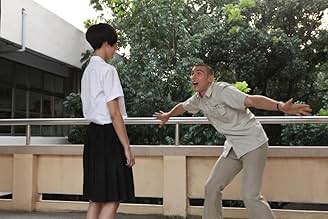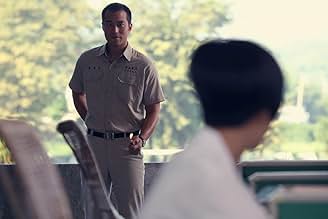A well-made, coming-of-age drama that explores friendship, romance, sexuality and politics, Yang Ya-Che's GF*BF (alternatively titled as GIRLFRIEND BOYFRIEND) is one of the best Taiwanese movies I've ever come across. No wonder the movie is well-deserved to earn 7 nominations at the 49th Golden Horse Awards (which later won Gwei Lun-Mei a Best Actress award as well as Audience Choice Award).
Told over the span of three decades (1985, 1997 and 2012), the movie begins with a brief prologue set in the present day before it goes back in time in 1985, where we are introduced to three Taiwan high-schoolers Mabel (Gwei Lun-Mei), Liam (Joseph Chang) and Aaron (Rhydian Vaughan). All of them are activists rebelling against the martial law during the turbulent period of 1980s Taiwan. On the personal side, Mabel loves Liam a lot, but Liam doesn't really have a feeling for her. So she ends up falling in love with Aaron instead. Liam, in the meantime, is actually a closeted homosexual who's been longing for Aaron. This is one complicated love triangle which will make your head spin upon watching the movie.
Which is why the trio's love triangle is one of the unique selling points in GF*BF. All three actors delivered top-notch and remarkably convincing performances where you'll feel emotionally involved with them. Gwei Lun-Mei is particularly excellent in what would be her best performance to date as a spunky girl with hidden vulnerability. Joseph Chang is equally captivating as a silent-type individual who loves to bottle up his emotion, and he's especially good when he communicates his character through his expressive eyes. Rhydian Vaughan is perfectly cast as a playful and sweet-talking Aaron.
Yang's direction is well-calculated and more than often, he successfully delivers a roller-coaster ride of varied emotions ranging from happiness to heartbreak with such genuine affection. On the other hand, Yang's keen observation over the multiple themes he's been exploring throughout his movie is passionately told, yet thought-provoking enough at the same time. Even the political aspect depicted earlier in the movie, which is actually served as a mere backdrop, has a certain impact served in his storyline.
The 1985 segment is easily the most memorable moment of all as Yang captures the sheer exuberance of what it's like to be a rebellious youth during that particular era where rules don't apply and freedom of speech is crucial for living a life to the fullest.
If there's a flaw in the movie, I must say that Vaughan's performance can be a bit underwhelming at times. Other than that, Yang's complicated storyline can be a little convoluted.
Production values are ace, while the soundtrack hits all the right notes in term of capturing the essence of the three different eras as well as the overall context of the movie.































